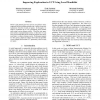Free Online Productivity Tools
i2Speak
i2Symbol
i2OCR
iTex2Img
iWeb2Print
iWeb2Shot
i2Type
iPdf2Split
iPdf2Merge
i2Bopomofo
i2Arabic
i2Style
i2Image
i2PDF
iLatex2Rtf
Sci2ools
AAAI
2015
2015
Improving Exploration in UCT Using Local Manifolds
Monte Carlo planning has been proven successful in many sequential decision-making settings, but it suffers from poor exploration when the rewards are sparse. In this paper, we improve exploration in UCT by generalizing across similar states using a given distance metric. When the state space does not have a natural distance metric, we show how we can learn a local manifold from the transition graph of states in the near future. to obtain a distance metric. On domains inspired by video games, empirical evidence shows that our algorithm is more sample efficient than UCT, particularly when rewards are sparse.
| Added | 27 Mar 2016 |
| Updated | 27 Mar 2016 |
| Type | Journal |
| Year | 2015 |
| Where | AAAI |
| Authors | Sriram Srinivasan, Erik Talvitie, Michael H. Bowling |
Comments (0)

